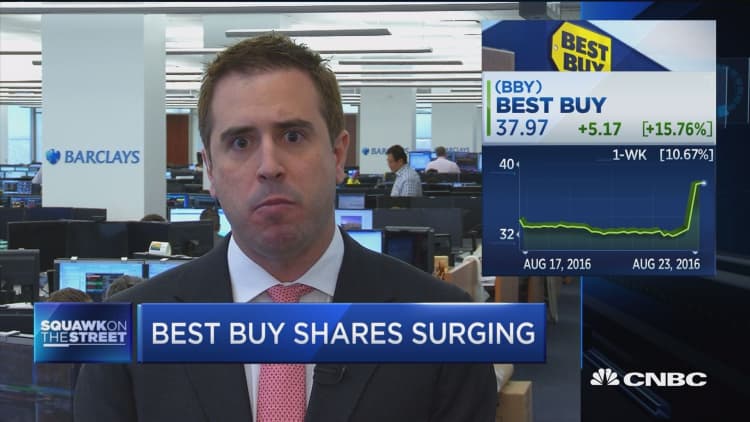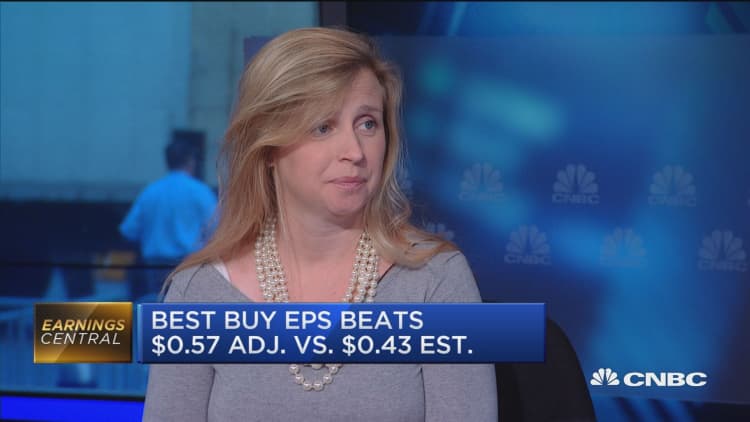


It wasn't long ago that Amazon was considered to be the death knell for Best Buy's business. That's no longer the case.
The bricks-and-mortar electronics chain on Tuesday said its U.S. online sales grew 23.7 percent during its fiscal second quarter, marking the second straight quarter of nearly 24 percent growth.
That rate of expansion comes on top of a 17 percent lift in the prior-year period, and outpaced growth in the broader e-commerce industry, according to the Commerce Department.
Best Buy's digital sales, which account for 11 percent of its revenue, helped the retailer deliver a surprise lift in comparable-store sales for the quarter, as it reported more measured gains in consumer electronics, computing and mobile phones, and appliances.
The company's shares shot 18 percent higher in afternoon trading.
"That's one of the best e-commerce growth rates for the entire retail industry," Barclays analyst Matt McClintock told CNBC. "That actually says that Best Buy is relevant online, that Amazon potentially isn't as big of a threat as people think for Best Buy as maybe it is for a Target or a Wal-Mart."
Best Buy CEO Hubert Joly attributed the company's digital sales growth to faster and more narrow delivery windows, a speedier checkout process, better navigation and more relevant product recommendations.
Yet he emphasized that the company's stores — once viewed as showrooms that would send shoppers to Amazon to complete their purchase — are a "key asset" in allowing Best Buy to stand out from the competition.
"It's quite intertwined," he said.
Best Buy's domestic comparable sales edged up 0.8 percent during the second quarter, topping analysts' expectations for a 0.4 percent decline. The mood on Wall Street had become more pessimistic regarding Best Buy over the past few days, afterWal-Mart and Target reported weakness in their electronics businesses.
Wal-Mart listed softer-than-expected TV sales as a headwind to its second-quarter revenue, while Target called out a 20 percent slide in sales of Apple products.
Without specifically pointing to Apple, Best Buy's new CFO Corie Barry said the company saw market share gains across categories and vendors. Joly added that Best Buy has been attracting new customers.
"We do think its more of a market share thing," Citi analyst Kate McShane told CNBC.
The retailer was also able to defy deflation in the 4K TV category, which is becoming less expensive as the product is more widely distributed.
Still, Best Buy's quarter was far from perfect. Though the company snapped two quarters of domestic revenue declines, growth of 0.1 percent was anything but robust. Likewise, its U.S. comparable sales slowed from 3.8 percent growth in the prior-year period to a more modest 0.8 percent.
Meanwhile, the company has been repurchasing its stock, which lifted its earnings by 5 cents a share during the quarter. Notwithstanding that purchase, however, Best Buy still would have beat Wall Street forecasts by 9 cents a share.
Looking to the second half, Best Buy expects new product launches in mobile phones (i.e., Apple's iPhone) and wearables to contribute to flat revenue. Yet pressures are expected to persist from deflation in categories including 4K TVs.
"Consumer electronics is a pretty difficult business," McShane said.


